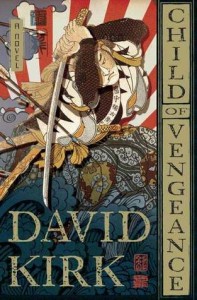A Book Review by Stefanie Field
Child of Vengeance by David Kirk
This book is like a B-rated Hollywood movie, but one that you wouldn’t mind replaying while the family is out of the house. Child of Vengeance is exactly what the title suggests – a boy bent on revenge. Based on the historical legend of Musashi Miyamoto, this novel explores the upbringing of a child torn between two lifestyles and faced with the irony of the samurai way. Although the similarities to the actual historical figure are few, the novel tends to focus on Miyamoto’s teenage years as he fought duel after duel as a ronin, a masterless samurai of the feudal periods.
Bennosuke, abandoned by his father when he was eight, has strived to be worthy of his last name. Although outcasted from his local village due to his physical deformities and his father’s mysterious past, he has remained in the shadows of a temple under the tutelage of his uncle, Monk Dorinbo. Yet, everyday, his passion to be a samurai grows as he waits for his father to return. Munisai Shinmen earned the title of the Nation’s Finest, the best of samurais in a countrywide tournament, and he remains loyal to his Lord Shinmen. After subjecting a young boy to seppuku, Munisai decides to abandon his post and raise his son like he had wished for. However, eight years of self-exile will not let the crimes of his past escape him. They will catch up and throw his son, Bennosuke, on an adventure which will defy all the values that defined him since birth.
As mentioned, the contradictory nature of the samurai culture from 16th-17th century Japan is prominent throughout the novel. The values and manner of respect (as portrayed in a hierarchy of social classes) is confronted and challenged often. For example, the ideology of loyalty for samurai underlies many o fthe relationships in the novel. Yet, the spoiled son of a Lord holds the life of a samurai in his palm just from the title of his birth and as Lords’ allegiances change, their subservient samurai follow without argument. Honor and pride are valued traits of a samurai, yet the book displays the simplicity of manipulating a samurai’s life. At the whim of his master’s word, he will commit seppuku or offer it himself and the value of death proves to be more significant than the value of life. In another scenario, imprisoned peasants condemned the samurai, for using their superior position of “honor” to continually wage war and exploit the farmers who feed them. I actually found this scene reminiscent to Akira Kurosawa’s 1941 film, Seven Samurai, in which the self-proclaimed rogue samurai exposes his comrades for the difficulties the farmers face, arguing they had no right to look down as peasants.
On a broader scale, the book doesn’t intend to insult the samurai culture. Rather, it describes the journey of a teenage boy during an important time in his coming-of-age when he must compare the realities of society with his personally enshrined ideals. This is something every person experiences. When you are a kid, your parents are the most influential role models in your life and their words are everything. But as you grow older, you realize your parents aren’t as cool as you thought, and not everything they say is correct. It’s a point in your life when you begin to analyze everything you experience and define your own individual character than follow what is expected of you. In this novel, there is a prominent desire to prove one’s masculinity and courage. For a book of adventure focusing on the heroic accomplishments of a boy, it does a good job in re-evaluating the protagonist’s principles as he faces the consequences of his choices.
However, I was greatly disappointed with the lack of women in the novel. One existed in the entire 300 pages. While there was no role of a mother in Bennosuke’s life, the memory of her was portrayed as borderline mentally crazy but thank goodness her genes can pass on her vengeful spirit. I recognize women had little respect from 16th-17th century Japanese society. Yet, this novel gave me no implication that it was targeted for male and female readers.
Overall, I give this book 3 stars out of five.
✭✭✭✰✰
This is a decent buy for audacious teenage boys, but only worth borrowing for anybody else. The story and characters are quite typical with no deep analysis necessary. I suggest this for those who primarily want an adventure for entertainment.
Stefanie Field is a graduate student pursuing a Master’s Degree in International Relations in Bangkok. She is a lover of books and hopes to promote reading culture in Thailand.


